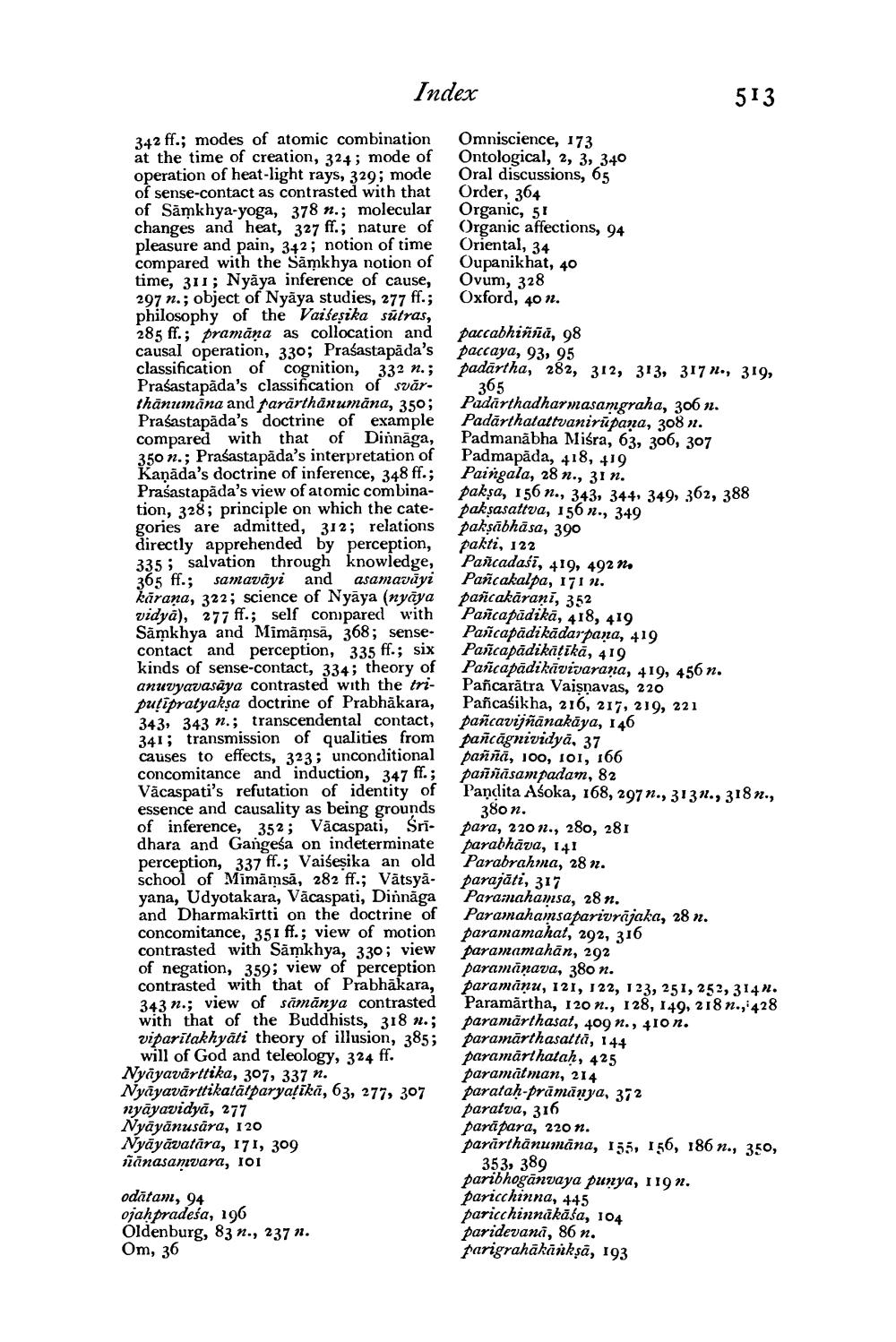________________
Index
342 ff.; modes of atomic combination at the time of creation, 324; mode of operation of heat-light rays, 329; mode of sense-contact as contrasted with that of Samkhya-yoga, 378 n.; molecular changes and heat, 327 ff.; nature of pleasure and pain, 342; notion of time compared with the Samkhya notion of time, 311; Nyaya inference of cause, 297 n.; object of Nyaya studies, 277 ff.; philosophy of the Vaiseṣika sütras, 285 ff.; pramana as collocation and causal operation, 330; Prasastapāda's classification of cognition, 332 n.; Prasastapāda's classification of svarthanumana and parärthanumana, 350; Prasastapāda's doctrine of example compared with that of Dinnaga, 350 n.; Prasastapäda's interpretation of Kanada's doctrine of inference, 348 ff.; Prasastapāda's view of atomic combination, 328; principle on which the categories are admitted, 312; relations directly apprehended by perception, 335; salvation through knowledge, 365 ff.; samaväyi and asamaväyi karana, 322; science of Nyaya (nyaya vidya), 277 ff.; self compared with Samkhya and Mimämsä, 368; sensecontact and perception, 335 ff.; six kinds of sense-contact, 334; theory of anuvyavasaya contrasted with the triputipratyaksa doctrine of Prabhakara, 343, 343 n.; transcendental contact, 341; transmission of qualities from causes to effects, 323; unconditional concomitance and induction, 347 ff.; Vacaspati's refutation of identity of essence and causality as being grounds of inference, 352; Vacaspati, Śrīdhara and Gangeśa on indeterminate perception, 337 ff.; Vaiseṣika an old school of Mimämsā, 282 ff.; Vätsyayana, Udyotakara, Vacaspati, Dinnaga and Dharmakirtti on the doctrine of concomitance, 351 ff.; view of motion contrasted with Samkhya, 330; view of negation, 359; view of perception contrasted with that of Prabhakara, 343 m.; view of samanya contrasted with that of the Buddhists, 318 2.; viparitakhyāti theory of illusion, 385; will of God and teleology, 324 ff. Nyayavarttika, 307, 337 n. Nyayavärttikatätparyaṭīkā, 63, 277, 307 nyayavidya, 277 Nyayanusara, 120
Nyayavatara, 171, 309 ñanasamvara, 101
odātam, 94 ojaḥpradeśa, 196
Oldenburg, 83 n., 237 n. Om, 36
Omniscience, 173 Ontological, 2, 3, 340 Oral discussions, 65 Order, 364 Organic, 51
Organic affections, 94 Oriental, 34 Oupanikhat, 40 Ovum, 328 Oxford, 40 12.
paccabhiññā, 98 paccaya, 93, 95
padartha, 282, 312, 313, 3172., 319, 365
513
Padarthadharmasamgraha, 306 n. Padarthatattvanirupana, 308 n. Padmanabha Miśra, 63, 306, 307 Padmapada, 418, 419 Paingala, 28 n., 31 n.
paksa, 156 n., 343, 344, 349, 362, 388 pakṣasattva, 156 ., 349 pakṣābhāsa, 390 pakti, 122 Pañcadasi, 419, 492 n Pañcakalpa, 1712. pañcakāraṇī, 352 Pañcapadika, 418, 419 Pañcapädikadarpana, 419 Pañcapadikāṭikā, 419
Pañcapadikavivarana, 419, 456 n. Pañcaratra Vaiṣṇavas, 220 Pañcasikha, 216, 217, 219, 221 pañcavijñānakāya, 146 pañcagnividya, 37 paññā, 100, 101, 166 paññāsampadam, 82
Pandita Aśoka, 168, 297 n., 3131., 318n., 380 n.
para, 220 n., 280, 281 parabhava, 141 Parabrahma, 28 n. parajāti, 317 Paramahamsa, 28 n.
Paramahamsaparivrājaka, 28 n. paramamahat, 292, 316 paramamahān, 292
paramanava, 380 n.
paramānu, 121, 122, 123, 251, 252, 314. Paramartha, 120 n., 128, 149, 218 n., 428 paramarthasat, 409 n., 410 n. paramarthasattä, 144
paramarthataḥ, 425 paramatman, 214 parataḥ-pramanya, 372 paratva, 316 parapara, 220 n.
pararthanumana, 155, 156, 186 n., 350,
353, 389
paribhoganvaya punya, 119 n. paricchinna, 445 paricchinnakasa, 104
paridevana, 86 n. parigrahākānkṣā, 193




